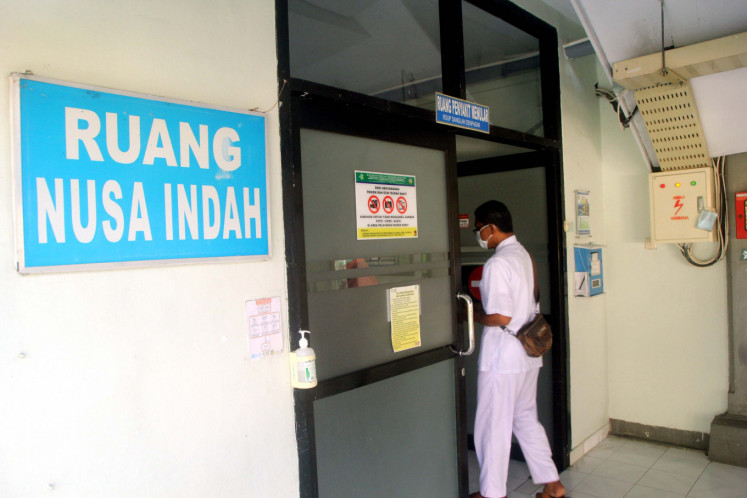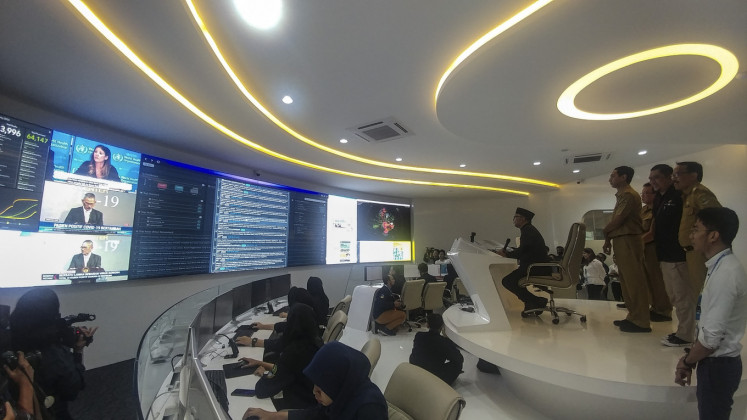Popular Reads
Top Results
Can't find what you're looking for?
View all search resultsPopular Reads
Top Results
Can't find what you're looking for?
View all search resultsCOVID-19: Possible community spread sparks fears of wider contagion in Indonesia
Community transmission is considered a game-changer in any epidemic in that it subverts previously discernible patterns, since specific sources of viral transmission become difficult to track down, according to the World Health Organization.
Change text size
Gift Premium Articles
to Anyone
W
ithin the first few weeks of the initial COVID-19 coronavirus outbreak in Wuhan, Hubei province, China in January, the Indonesian government took several measures to prevent its citizens from coming into direct contact with individuals from the outbreak epicenter and other regions with confirmed cases.
These measures included grounding all flights to and from mainland China, as well as issuing a travel ban on countries that have reported confirmed COVID-19 cases as the government attempted to maintain its then-zero-case record.
The playing field has changed, however, as Indonesia has now been made to confront the possibility of “community transmissions” – in which a patient with no travel history to countries with virus outbreaks or no specific contact with other infected patients – within its borders since the announcement of the first confirmed COVID-19 cases on March 2.
The government reported the first possible community transmission of COVID-19 on Tuesday, after a citizen with no link to certain confirmed cases or a history of travel to affected countries tested positive for the virus. The 33-year-old man was Indonesia’s 27th confirmed COVID-19 patient.
Nusa Indah Room where the isolation room of a patient No. 25 foreign nationals infected with the COVID virus 19 who died after being treated at Sanglah Hospital on 2.45 pm at the Bali Governor's Office Wednesday 11/03/2020. (JP /Zul Trio Anggono )“We suspect that [Case 27] is a local transmission. We are currently tracking the source of transmission because this is not an imported case and it’s still unknown which cluster he is part of,” said the Health Ministry’s Disease Control and Prevention director general, Achmad Yurianto.
The government’s latest announcement seemed to have confirmed the disconcerting possibility of there being an entire swath of undetected COVID-19 cases who may have come into contact with other individuals within their circles, therefore starting a cycle of so-called community transmissions that would go on to affect other regions within and even beyond the country’s borders.
The country’s 27th confirmed COVID-19 patient was only the latest in a growing string of cases involving local citizens who might have contracted the virus from an unknown source, making transmissions of its kind particularly difficult to trace.
The Australian state of Victoria announced on March 8 its latest confirmed COVID-19 case involving a 50-something Indonesian woman who tested positive for the coronavirus.
The woman, identified only as Case 12, flew from Jakarta to Perth on Feb. 27 – four days before the Indonesian government’s official announcement of the first two COVID-19 cases in the country.
The Victoria administration then urged locals to avoid the vicinity of a Vietnamese restaurant where the woman was known to have dined on March 6 to avoid the risk of viral transmission.
Yurianto claimed that the woman could have contracted the virus in the Vietnamese restaurant, but some have doubted the claim, saying the woman was diagnosed with COVID-19 on March 8 and had already shown symptoms on Feb. 29. With the incubation period ranging from 14 to 28 days, it is more likely that the woman was infected in Indonesia.
Two days later, the Singaporean Ministry of Health announced that two of its most recent COVID-19 patients likely contracted the virus in Indonesia.
A 65 year-old Indonesian man – identified as Case 152 – was an imported case who arrived in Singapore on March 7, according to the ministry.
Prior to his arrival in Singapore, the man reported early symptoms on Feb. 28 and sought treatment at a hospital in Jakarta on March 2, but it was still unclear whether he undertook tests for the coronavirus. He was only later found to have tested positive for COVID-19 on March 8 in Singapore.
On the same day, the Singaporean government announced Case 153, a Singaporean woman who was likely to have contracted the virus in Indonesia while she visited her sister who had pneumonia from Feb. 25 to 28 – three days before the official announcement of the first confirmed COVID-19 cases in Indonesia.
West Java Governor Ridwan Kamil (center) monitors information related to the spread of COVID-19 at the Command Center as well as the COVID-19 Information and Coordination Center in Bandung, West Java, Tuesday, March 10, 2020. (JP /Arya Dipa)The above cases, along with their elusive points of viral transmission, have raised concerns regarding possible community transmissions by which a number of Indonesian citizens had already contracted the coronavirus from undetected cases in the country prior to their overseas trips.
An Indonesian medical scientist based in Singapore, who declined to be named, said he believed a wider contagion had taken place in Indonesia than what has been reported.
“It is possible that many cases go undetected in Indonesia based on what we know so far from the imported cases from Indonesia in Singapore and Australia,” he said.
He argued that while the disease may not be as deadly as many people fear, we should not take the virus outbreak lightly. “This disease disproportionately kills the elderly. If you are infected, it may not be a problem, but you can transmit it to your parents.”
Community transmission is considered a game-changer in any epidemic in that it subverts previously discernible patterns, since specific sources of viral transmission become difficult to track down, according to the World Health Organization.
Bayu Krishnamurthi, who headed the National Committee for Avian Flu Control and Pandemic Preparedness from 2006 to 2010, previously told the Post that community transmission “is a more serious situation” than direct transmission.
Bayu, however, cautioned that it was too early to conclude that community transmission had taken place. "We need to check if a community transmission truly occurred," he said. "If it did, then new measures to [handle the virus] are needed."
Syahrizal Syarief, an epidemiology expert from the University of Indonesia, said that conducting contact-tracing on the country’s 27th confirmed COVID-19 case would be difficult because the point of transmission remained unknown.
The expert, however, said the situation was still under control.
“As long as the government follows the standard procedures, I don’t think it will be a problem. Standard protocol entails conducting contact-tracing as early as possible to contain the spread,” he said, adding that Singapore had 17 cases with no clear origins of infection.
Indonesia reported its first death from the coronavirus on Wednesday, a 53-year-old COVID-19 patient and foreign citizen identified as Case 25.
By Wednesday, there were 34 confirmed cases of COVID-19 in the country.












